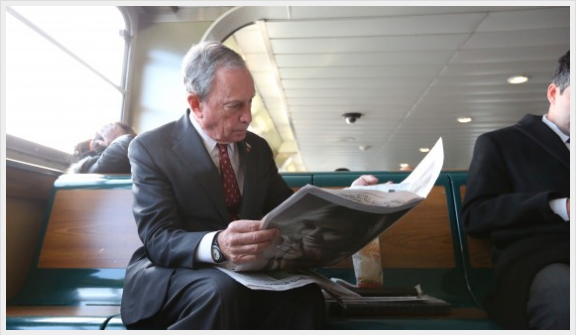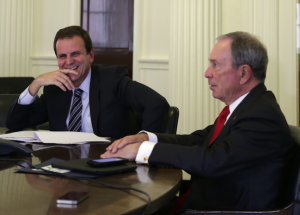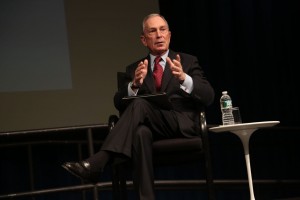
Photo: New-York-City-Mayor´s-Office
Interview: Michael Bloomberg, outgoing Chair and current President C40 Cities
18 February 2014
by Richard Forster
He may no longer be mayor of New York but having just been appointed UN Special Envoy for Cities and Climate Change and President of C40 Cities, Michael Bloomberg will continue to play a very active role for cities in the fight against climate change.
As Chair of C40, you have overseen an increase in membership and a higher profile for the organisation. What do you consider your biggest achievements for C40? What remains to be done and will you be involved in that?
Growing the organisation was important, and in 2012, the C40 welcomed five additional cities: Oslo, Singapore, Vancouver, Venice, and Washington DC. However, developing a world-class research operation and then implementing measurement tools to assess our progress and the impact we’re having is the most important thing we’ve done. As the C40 continues to move forward, we will remain particularly focused on research and collecting the data necessary to allow us to take effective action. New research finds that the C40 has the potential to further reduce emissions by more than 1 billion tonnes a year by 2030–an achievement equivalent to making both Canada and Mexico entirely carbon-neutral. We want our cities to lead by example and offer ideas to others who want to be proactive, not just C40 cities.

A next step for C40–and something I want to help Chairman Paes [Eduardo Paes, Mayor of Rio de Janeiro] within my role as President of the Board–is to bring more of the world’s developing cities into the organisation. They are the future of the planet, and we have a unique opportunity–via the C40–to help them plan, develop and grow smartly so that they are well equipped to handle the challenges that climate change will pose not only now but in the future.
You were interviewed by Benjamin Barber for his latest book If Mayors Ruled The World. What do you think of his proposal to have a Global Parliament of Mayors? Would this not simply detract from C40 and duplicate the work of the city networks which already exist?
We need to make mayors more interconnected. That is one of the founding principles of the C40: the sharing of knowledge and resources among cities so that their local actions can have a global impact. More broadly through my philanthropy, I’ve worked to bring cities together to share best practices, to share resources, and to collaborate in other areas like fighting crime, improving public health and achieving operational efficiencies. The more we can encourage cooperation among mayors the better.
The COP19 negotiations in Warsaw included the first ever ‘cities day’. What were your thoughts on the negotiations?
Cities have earned a seat at the table in the global conversation because of the success we are having. To a great extent, cities already have the power, the resources, and the expertise they need to tackle a tough problem. And that’s certainly true of climate change. Of course, we can always use more support at the national and international levels, but we aren’t waiting for that to happen. There’s too much at stake.
Whether tackling the environment or crime or education or transport, mayors are expected to deliver results. Mayors are problem-solvers and pragmatists; we’re not interested in national party politics. Residents hold us accountable for improving conditions in their communities. That’s why cities have become laboratories of change in this area.
As a philanthropist, as well as a successful businessman and politician, what role do you plan to have with regard to cities when you retire from being Mayor of New York?
At the request of the new C40 Chair, Mayor Paes, I am staying on as President of the Board. Bloomberg Philanthropies will also remain a key funder of C40, and we have an entire programme area, Government Innovation, dedicated to working with mayors around the world in helping them solve local problems and then spreading their solutions.
C40 takes a pragmatic approach by setting goals among members but then it lets each city develop their own programme that is viable for them. How do you choose new member cities and what criteria are applied to ensure cities adopt the C40 approach?
While C40 originally targeted megacities for their greater capacity to address climate change, we now offer three types of membership categories to reflect the diversity of cities taking action on this issue. The categories consider such characteristics as population size, economic output, and environmental leadership.
We do not prescribe what a city should do. The C40 works to empower cities to connect with each other and share technical expertise on best practices.
Is the day coming soon when national climate negotiations will be sidelined by cities at forums like Rio+20 and COP meetings?
 Cities account for some 70 percent of global greenhouse gas (GHG) emissions, so solutions to climate change must run through cities. Half the world’s people already live in cities and that number is only going to increase. Coastal cities, including New York, are facing the realities of rising sea levels. Growing cities are facing the need for more housing, infrastructure, and mass transit. Ageing cities need to ensure buildings, roads, infrastructure and waste programmes can accommodate modern demands. The list goes on.
Cities account for some 70 percent of global greenhouse gas (GHG) emissions, so solutions to climate change must run through cities. Half the world’s people already live in cities and that number is only going to increase. Coastal cities, including New York, are facing the realities of rising sea levels. Growing cities are facing the need for more housing, infrastructure, and mass transit. Ageing cities need to ensure buildings, roads, infrastructure and waste programmes can accommodate modern demands. The list goes on.
The US government has largely failed to act on any of these issues. Cities understand the importance of immediate action and that’s why I got involved in C40.
You once stated that ‘if you can’t measure it, you can’t manage it’. Aren’t there now too many different emission measurements, rankings and indexes by companies and cities, thereby creating greater confusion and distortion?
We believe that with better measurement comes better management. And with the right processes in place, cities can share strategic insights and reduce their exposure to climate risks and impacts.
C40 was established primarily to reduce emissions in cities, yet during your tenure you made partnerships with the sustainable cities group, ICLEI, that primarily focuses on resilience. Is there room for further partnerships, and are these at the risk of reducing emphasis on emissions reduction?
C40’s partners and funders understand the relationship between cities and climate change and are committed to advancing urban leadership in driving solutions. The vital and groundbreaking work we are carrying out in various capacities with our partners–including the World Bank, CDP [Carbon Disclosure Project] and WRI [World Resources Institute]–goes hand in hand with reducing emissions. Whether implementing bus rapid transit or increasing energy efficiency in buildings, our cities are taking actions to tackle emissions and improve the quality of life for their citizens at the same time.
Only two cities from mainland China have joined C40, yet you are targeting more Chinese cities to become members. How is this developing?
China has a rapidly growing urban population so getting more Chinese cities on board is crucial in our efforts to reduce emissions globally.
Our staff, and particularly our Regional Director for East Asia, is working tirelessly to engage various city governments to get involved in the C40. We look forward to welcoming more Chinese cities on board in the future, and this is something I’m committed to help the organisation do.
What would your advice be to the incoming C40 Chair?
Mayor Paes is a determined, focused leader with a clear passion for his city, his constituents, and the mission of our C40 organisation. At the 2012 Rio+C40 Summit in his home city, he rightly stated that the future of climate change starts with cities. As chairman of C40, I have no doubt he will continue to propel actions at the city level to the forefront of the global conversation on climate change.
——–
BIOGRAPHY:
BORN: 14 February 1942, in Boston, Massachusetts (USA)
STUDIES: Johns Hopkins University and Harvard University, where he earned a Master of Business Administration degree in 1966
CAREER:
- Joined Wall Street-based Salomon Brothers investment bank, where by 1972 he became partner.
- In 1981 he started his own company, Bloomberg L.P., based on a financial computer data system that revolutionised the way securities data was stored and used. This branched into a media empire and as one of the richest men in the world became a philanthropist particularly in medical research, arts and education.
- In 2002 he became the 108th mayor of New York City, winning three four-year terms, stepping down as mayor on 31 December 2013.
- 2010-2014 Chair of C40 Cities
——–






